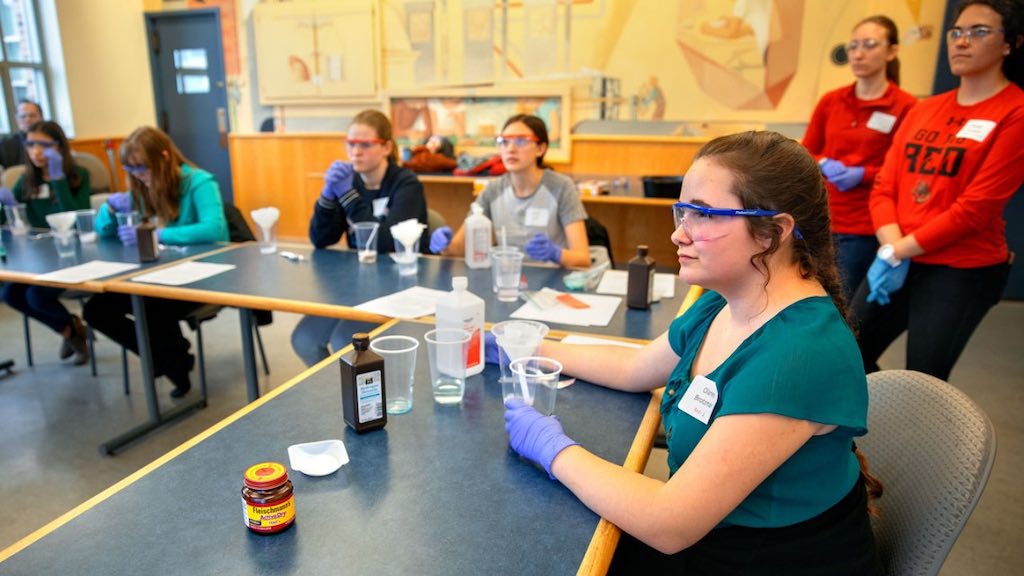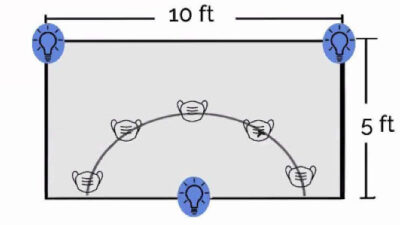Cornell University's Women’s Outreach in Materials, Energy and Nanobiotechnology (W.O.M.E.N.) program helps promote scientific careers for high school girls curious about a career in science.

Female high school sophomores from central New York came to Cornell University to explore the world of science and engineering with hands-on activities led by male and female graduate students. Many of these students from the New York area are looking to make science part of their future and the Women’s Outreach in Materials, Energy and Nanobiotechnology (W.O.M.E.N.) program in Olin Hall serves to solidify that.
The W.O.M.E.N event was launched in 2010 as a way to encourage female high school students from rural areas to consider technical careers. The program was started by Susan Daniel, a Cornell associate professor of chemical and biomolecular engineering, along with a graduate student from Deposit, New York. They realized rural high school students often have limited opportunities to prepare for the rigorous scientific coursework of college. For young girls, the opportunity itself presents its own challenge.
“There’s a lot of messaging from society that these careers are too geeky or it’s not cool to be a scientist. We are trying to combat that myth,” said Daniel in a press release. “This event helps fire up young minds and help them see that they, too, can be scientists.”
Providing opportunities for young girls
This year, students from 12 school districts spread across nine counties in New York, plus two in Pennsylvania, took part in labs focused on biological, process, and materials engineering. The students hailed from rural districts with limited opportunities for science clubs and Advanced Placement (AP) courses that earn students college credit while still in high school.
“This is our community, and this is the state we serve,” Daniel said. “Cornell has a mission to serve the citizens of New York. There are lots of kids in small towns who don’t have resources, so this is an opportunity to reach that population and give them a sense of the opportunities they could have.”
Since its inception in 2010, hundreds of students have taken part in the program. The trend is reflected in the college’s engineering program. Half of the freshman undergraduate students in Cornell’s College of Engineering are female. It’s a trend, helped by initiatives like the W.O.M.E.N. program, that has been gaining traction nationally. Daniel said keeping young students engaged, especially those in their sophomore year of high school, is critical to maintaining those gains.
“Sophomore year is the time when students might start shying away from physics, from chemistry,” Daniel said. “We are encouraging them to be bold so that when they get to college they are keeping all those doors open.”
Ferra Pinnock, a doctoral student in the field of chemical and biomolecular engineering and one of 30 Cornell graduate students who volunteered at the event, said she wished she had a program like W.O.M.E.N. when she was younger.
“As a kid, I wasn’t even aware that science really existed as a career option,” she said in a press release. “Now, for me, I realize that having access to role models in these fields – and to the fields themselves – is so necessary and empowering, especially for young girls.”
Along with activities for the high school students, the W.O.M.E.N. program also offered sessions for the parents. Graduate students spoke about their college experiences and answered questions.
Chris Vavra, production editor, Control Engineering, CFE Media, [email protected].
ONLINE extra
View an article highlighting women in STEM and how perceptions are changing.
Learn more about the W.O.M.E.N. program and what it offers to students.



